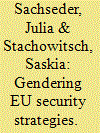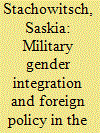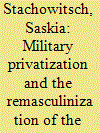| Srl | Item |
| 1 |
ID:
192991


|
|
|
|
|
| Summary/Abstract |
Visuals, including photographs and data visualizations, play a crucial role in the politics of EU border security, both as an internal governance tool (e.g. in surveillance) and as an external means of communication/representation (e.g. in photojournalism). Combining scholarship on photographic representations of migration with literature on surveillance technologies and data visualizations, we argue that these visuals interact to reproduce gendered and racialized meanings of migration and border security. Using a feminist postcolonial lens, we develop an intervisual framework for studying how processes of gendering and racialization render subjects, practices and spaces knowable at the intersection between these visuals. We apply this framework to a case study of Frontex’s Risk Analysis Reports (2010–2021) and demonstrate how it is applicable to other security institutions. The intervisual analysis reveals how the migrant Other and (white) European are visually reproduced through: 1) the (in)visibilization of bodies; 2) the ascription and denial of agency; and 3) the spatialization of borders as ‘frontier imaginings’ that oscillate between fortification and expansionism. The intersectional co-constitution of gender and race, we conclude, is central to the visual politics of Frontex, contributing to problematizing migrants and migration and legitimizing violent border practices.
|
|
|
|
|
|
|
|
|
|
|
|
|
|
|
|
| 2 |
ID:
193145


|
|
|
|
|
| Summary/Abstract |
This paper explores the relationship between the EU’s current re-imagining as a global security actor and its stance as a global promoter of progressive gender norms. For this purpose, we analyse how gender and race are constitutive of the meanings of security and Europe in major EU security strategies, and how this relates to the way gender (equality) is addressed as a policy issue. We find that, in the context of waning liberal world order and manifold internal and external crises, EU security actorness is constructed through narratives of masculinisation that entail feminisation of the EU’s own past as a “peace project” and “soft power”; Othering of non-EU spaces and subjects; colonial perspectives on the EU’s role in the world as “White Man’s burden” and the reconstruction of whiteness through notions of “neutral” masculinities associated with technocratic professionalism, superior knowledge production, and market rationality. This intersectional gendering of EU security limits the emancipatory potential of gender policy through the racialisation of Other women and the simultaneous invisibilisation of postcolonial structures of inequality. Our analysis provides the groundwork for addressing how and why the EUropean security project continues to reproduce intersectional power relations and insecurities, despite commitments to gender equality and non-discrimination.
|
|
|
|
|
|
|
|
|
|
|
|
|
|
|
|
| 3 |
ID:
114593


|
|
|
|
|
| Publication |
2012.
|
| Summary/Abstract |
The article investigates the relevance of foreign policy discourse and practice for military gender relations. The link between women's status in military institutions and the gendering of foreign policy has so far not been thoroughly addressed in military and gender research or foreign policy analysis. Feminist international relations provides a research strategy to show how foreign policy doctrines and debates are gendered and how they are connected to gender (in)equality in central state institutions such as the military. The article thus applies feminist international relations as a theoretical framework that transcends the constructed dichotomy between national and international levels of analysis. In a case study of the USA from the Clinton to the Obama administrations, patterns of military gender integration are established as a phenomenon incorporating both domestic and international dimensions. Foreign policy discourses and practices in this time period are related to shifts in military gender policies and discourses on gender integration. It is argued that the gender order in military institutions is linked to international politics and state behaviour in the international arena.
|
|
|
|
|
|
|
|
|
|
|
|
|
|
|
|
| 4 |
ID:
121854


|
|
|
|
|
| Publication |
2013.
|
| Summary/Abstract |
This article examines the gendered implications of military privatization and argues that the outsourcing of military functions to the private sector excludes women from newly developing private military labour markets, impedes gender equality policies and reconstructs masculinist gender ideologies. This process constitutes a remasculinization of the state, in the course of which the nexus between state-sanctioned violence and masculinity is being reaffirmed. Recent research has introduced the concept of masculinity to the study of the private security sector. Building upon these approaches, the article integrates feminist theories of the state into the research field and evaluates their potential contributions to the analysis of military privatization. In an exemplary case study of the US military sector, this privatization is embedded within debates on the neo-liberal restructuring of the state and addressed as a gendered process through which the boundaries between the public and the private are being redrawn. The implications of these transformations are investigated at the levels of gender-specific labour division, gender policy and gender ideologies.
|
|
|
|
|
|
|
|
|
|
|
|
|
|
|
|